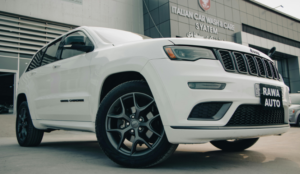Welcome to our deep dive into the world of the Jeep Grand Cherokee, specifically focusing on a question that intrigues many: How much does this popular SUV weigh?
Understanding the weight of a vehicle like the Jeep Grand Cherokee is more than just a number on a spec sheet. It’s about understanding how this figure impacts everything from fuel efficiency to towing capacity. So, let’s get started on this journey of discovery!
What Determines the Weight of the Jeep Grand Cherokee?
The weight of any vehicle, including the Jeep Grand Cherokee, depends on several factors. These include the size of the engine, the materials used in the body, and any additional features or accessories that might be included. For instance, a larger engine typically means more weight, and additional luxury features can add extra pounds too.
The Evolution of the Jeep Grand Cherokee’s Weight
Over the years, the Jeep Grand Cherokee has seen many changes. Newer models tend to be heavier due to more advanced safety features and luxury components. Understanding this evolution helps us appreciate how the brand has balanced between adding new features and maintaining efficiency.
Exact Weights of Different Jeep Grand Cherokee Models
When it comes to the Jeep Grand Cherokee, one size does not fit all – especially when we’re talking about weight. Just like how two seemingly identical bags of groceries can weigh differently, various models of the Jeep Grand Cherokee have different weights. Why? Because each model year brings in new designs, features, and sometimes even new technology, all of which can add to or subtract from the overall weight of the vehicle.
Yearly Variations: It’s All in the Details
Take, for instance, the 2020 and 2021 models of the Jeep Grand Cherokee. You might think, “They’re just a year apart; how different can they be?” Well, even a year can bring significant changes. The 2021 model might have added features like enhanced safety systems or a more robust sound system, all of which add extra weight.
2WD vs. 4WD: A Tale of Two Weights
Another factor that plays a big role in determining the weight is whether the Jeep is 2WD (two-wheel drive) or 4WD (four-wheel drive). As a rule of thumb, 4WD vehicles are heavier. This is because the 4WD system adds extra components like a transfer case and additional drivetrain parts. So, if you’re comparing a 2WD and a 4WD model of the same year, expect the 4WD to tip the scales a bit more.
Why Does This Weight Difference Matter?
You might wonder, “Okay, so there’s a weight difference, but why does it matter?” Well, the weight of your Jeep Grand Cherokee affects several things.
- Fuel Efficiency: Generally, the heavier the vehicle, the more fuel it consumes. So, a lighter model could save you some trips to the gas station.
- Handling and Performance: Weight influences how the Jeep handles on the road. Heavier models might feel more ‘planted’, especially in rough conditions, while lighter models could offer a bit more agility.
- Towing Capacity: If you’re planning to tow a trailer or a boat, the weight of your Jeep affects how much it can tow safely.
So, when you’re looking at different models of the Jeep Grand Cherokee, keep these weight differences in mind. They could affect everything from how much you spend on gas to how your vehicle handles on your next road trip. Remember, it’s not just about the looks and features; the weight plays a crucial role in the overall driving experience!
Why the Weight of Your Jeep Grand Cherokee Matters
Weight is a crucial factor in many aspects of a vehicle’s performance. It affects fuel efficiency – heavier cars typically use more gas. It also impacts handling and towing capacity. Knowing the weight of your Jeep Grand Cherokee can help you make informed decisions about how you use your vehicle.
How to Find Your Jeep Grand Cherokee’s Specific Weight

Curious about the exact weight of your Jeep Grand Cherokee? Finding this information is easier than you might think, and it’s quite handy, especially when you’re considering aspects like towing or fuel efficiency. Let’s break down the simple steps to determine your vehicle’s weight.
Check Your Owner’s Manual
First and foremost, grab your Jeep Grand Cherokee’s owner’s manual. This booklet, usually found in your glove box, is a treasure trove of information about your vehicle. Flip through the pages to the section on specifications. Here, you should find a detailed list of various weights including curb weight, gross vehicle weight, and sometimes even more specific details depending on your model’s features.
Look for the Sticker on the Driver’s Side Door
If you prefer a more hands-on approach, open your driver’s side door and look for a sticker on the door frame. This sticker isn’t just for show – it contains vital information about your Jeep, including its weight. This is typically referred to as the ‘curb weight’, which means the weight of the vehicle without passengers or cargo. It’s an easy and quick way to get the information you need.
Understanding Your Vehicle Identification Number (VIN)
Every car has a unique identifier known as the Vehicle Identification Number, or VIN. This isn’t just a random string of numbers and letters; it’s like your Jeep’s DNA. You can find your VIN on the lower corner of your windshield on the driver’s side or inside the door frame. This number can be used to obtain detailed information about your vehicle, including its weight. You can either consult the dealership, a knowledgeable mechanic, or use online resources where you input your VIN to get a detailed spec sheet of your vehicle.
Why Knowing Your Jeep’s Weight Matters?
Understanding the weight of your Jeep Grand Cherokee is not just about satisfying curiosity. It’s crucial for various practical reasons. It affects how much you can tow, how your vehicle handles different driving conditions, and even how much you spend on fuel. Plus, if you’re into customizing your Jeep, knowing its base weight is essential to make informed decisions about modifications and additions.
The Weight’s Impact on Maintenance and Repair
A heavier vehicle can mean more strain on certain parts, like brakes and tires. Knowing the weight of your Jeep Grand Cherokee can help you anticipate and plan for maintenance needs, ensuring your vehicle remains in top condition for longer.
Customizing Your Jeep Grand Cherokee and Weight Implications
Many Jeep owners love to customize their vehicles. It’s important to note that modifications like larger tires or additional bodywork can significantly increase the weight of your vehicle. This can affect everything from handling to legality, so it’s something to consider seriously.
Comparing the Jeep Grand Cherokee’s Weight to Other Vehicles
How does the Jeep Grand Cherokee stack up against its competitors in terms of weight? Understanding this can help you see where it stands in terms of fuel efficiency, performance, and more compared to similar vehicles in its class.
Real-World Use Cases: How Weight Affects Everyday Driving

When it comes to understanding how the weight of a Jeep Grand Cherokee affects day-to-day driving, nothing beats hearing from the people who take these vehicles out on the road every day. We’ve chatted with several owners to gather their insights and experiences. These stories offer a glimpse into the practical impact of the vehicle’s weight on daily driving.
1. City Driving – Navigating Through Traffic
Meet Sarah, a city dweller who uses her Jeep Grand Cherokee for her daily commute. “The weight of the vehicle definitely makes a difference in stop-and-go traffic,” she shares. “I feel the heft of the SUV, especially when accelerating from a stop. It’s not a deal-breaker, but it’s something I’ve had to get used to.” For city drivers like Sarah, the weight can translate into a slightly delayed response when accelerating, which is a small adjustment compared to the comfort and safety the vehicle provides.
2. Fuel Efficiency – Longer Trips and the Gas Station Visits
Then there’s Alex, who often takes his Grand Cherokee on long road trips. “I love the space and comfort, but I do notice that the weight affects fuel efficiency,” he notes. “I find myself stopping for gas more often than I did with my previous, lighter car.” This is a common observation among heavier vehicles – the trade-off for spaciousness and power is often seen at the gas pump.
3. Handling and Stability – On Windy Days and Curvy Roads
For Jenna, who lives in a region with lots of windy roads and varying weather, the weight of her Jeep Grand Cherokee offers a sense of stability. “I feel really secure in my Jeep, especially on windy days or when I’m driving on curvy mountain roads. The weight gives it a grounded feeling that’s reassuring.” This aspect of a heavier vehicle can be a significant advantage, providing a solid and stable driving experience.
4. Towing and Hauling – The Weekend Adventures
Mark, an outdoor enthusiast, often uses his Grand Cherokee for towing a small boat. “The vehicle’s weight plays a big role in its towing capacity. It handles the load really well, and I feel confident towing my boat to the lake.” For individuals like Mark, the weight of the vehicle is a boon, enabling them to haul equipment for their weekend adventures safely.
5. Winter Driving – The Snowy Challenges
Last but not least, we talked to Emily, who frequently drives in snowy conditions. “I’ve noticed that the weight of my Grand Cherokee helps with traction in the snow. It feels more stable and less likely to slide compared to lighter vehicles I’ve driven.” In snowy and icy conditions, a heavier vehicle like the Jeep Grand Cherokee can offer better grip and control, which is a crucial factor for drivers in colder regions.
Frequently Asked Questions: How Much Does a Jeep Grand Cherokee Weigh?
What is the average weight of a Jeep Grand Cherokee?
The average weight of a Jeep Grand Cherokee ranges from about 4,500 to 5,300 pounds, depending on the model year and trim level.
Does the Jeep Grand Cherokee’s weight vary by model year?
Yes, the weight can vary significantly across different model years, as newer models might include additional features or design changes that affect the weight.
How does the 4WD version of the Jeep Grand Cherokee compare in weight to the 2WD version?
The 4WD version of the Jeep Grand Cherokee is typically heavier than the 2WD version, due to the additional components required for the four-wheel drive system.
Can customizations or modifications alter the weight of a Jeep Grand Cherokee?
Yes, customizations like larger tires, additional bodywork, or aftermarket accessories can increase the weight of the vehicle.
Why is it important to know the weight of my Jeep Grand Cherokee?
Knowing the weight is important for understanding your vehicle’s fuel efficiency, handling, towing capacity, and for ensuring safe and proper maintenance.
Where can I find the specific weight of my Jeep Grand Cherokee?
You can usually find the specific weight on a sticker inside the driver’s side door or in the owner’s manual. The Vehicle Identification Number (VIN) can also provide detailed information.
Is the towing capacity of the Jeep Grand Cherokee influenced by its weight?
Yes, the weight of the vehicle plays a crucial role in determining its towing capacity. Heavier vehicles typically have higher towing capacities.
Conclusion
In wrapping up our exploration of the question, “How much does a Jeep Grand Cherokee weigh?” it’s clear that the weight of this iconic SUV is more than just a number. It’s a crucial aspect that influences many facets of the vehicle, from how it handles on the road to its fuel efficiency, towing capacity, and overall driving experience.
Understanding the weight of your Jeep Grand Cherokee can significantly enhance your ownership experience. Whether you’re navigating city streets, embarking on long road trips, or using your SUV for towing and outdoor adventures, the weight plays a pivotal role in how your vehicle performs in these various scenarios.
Remember, the specific weight of a Jeep Grand Cherokee can vary depending on the model year, trim, and any customizations or modifications you might have. So, it’s always a good idea to check the details for your specific model. This knowledge is not just about numbers; it’s about making the most out of your Jeep Grand Cherokee and enjoying all the capabilities this fantastic SUV has to offer.

Hello there, this is Thomas Byrd. I am a professional car mechanic who leads a team of junior mechanics in a repair and restoration shop. In the beginning, I used to work for a jeep service center as a basic worker. From there I keep learning, changed my job 2 times and now I am a professional who leads a group of mechanics. Though a have expertise in the jeep, I know very well about all types of cars. To share my knowledge and skills with others I have created this blog website. Whenever I get free time from work I give my time to my blog.

